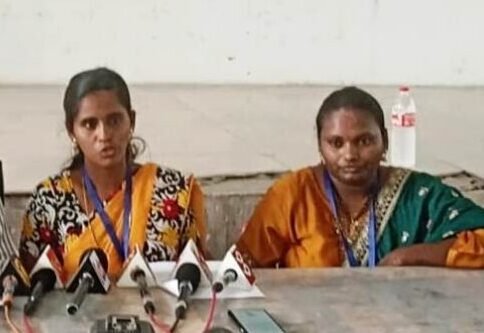URGENT RECOMMENDATIONS FOR PROTECTION OF MIGRANT WORKERS IN THE SECOND WAVE OF COVID
India is witnessing the second wave of COVID-19 infections, which has led to severe health challenges coupled with economic uncertainty. Migrant workers are facing the brunt of lockdowns, curfews and rising unemployment. Having faced similar hardship and loss last year, many migrant workers are returning to their origin points, fearing a possible complete lockdown.
During this “reverse migration” migrant workers suffer from problems that have not been resolved since the first wave of COVID-19. These include lack of free transport for migrant workers to go back to their origin points, low access to rations due to implementation challenges in the One Nation, One Ration Card system, poor implementation of the cash transfer packages, and lack of preventive health mechanisms in informal settlements.
Curbing bonded labor and trafficking – Lack of local employment opportunities and increased debt leads to the bonded labor and vulnerability to trafficking. Empowering and investing in Anti Human Trafficking Units (AHTUs) for rescues and relief can check the issue. Greater coordination between the judiciary, district administration and AHTUs also needs to be ensured.
Certain state governments have been seeking to resolve these challenges through positive measures:
- Frontline workers from the Odisha government are providing Covid-19 awareness as well as testing and treatment to migrant workers
- Rajasthan has set up medical camps in high priority districts for migrant workers
- Tamil Nadu and Kerala have announced free vaccination for migrant workers
- The Bihar government is spreading awareness regarding Ayushman Bharat and providing assistance to avail cashless healthcare.
Apart from the government, several private initiatives such as citizen led COVID WhatsApp groups are providing assistance in accessing resources (hospital beds, oxygen cylinders, medicines etc.)
While these actions by the state governments and private initiatives are commendable, IWG urges state and national government to provide relief to migrant workers through the following measures:
- Test and quarantine: Migrant workers should be tested at entry and exit points (to prevent community spread) and should be housed in COVID-19 safe rooms till results arrive. Those with negative tests could be provided free transportation to their destination states or cash support. Covid-19 safety kits, comprising of masks, sanitizer and helpline numbers should also be provided to the travelers, free of cost. Positive cases should be dealt with empathy and be directed to safe houses (in case of mild symptoms) or hospitals (severe cases) as per requirement.
- Labour Registration: Migrant support centres should be established to register migrants and for issuance of registration cards. This would address a long-term pending issue of building the unorganized labour database and will also curb leakages while transferring benefits.
- Curbing bonded labor and trafficking – Lack of local employment opportunities and increased debt leads to the bonded labor and vulnerability to trafficking. Empowering and investing in Anti Human Trafficking Units (AHTUs) for rescues and relief can check the issue. Greater coordination between the judiciary, district administration and AHTUs also needs to be ensured.
- Employment programs: The ongoing crisis has created severe economic insecurity among urban informal workers. A onetime cash relief programme along with an urban employment scheme in alliance with urban Public works can be launched. State Governments should also expand MGNREGA And Garib Kalyan Rozgar Abhiyaan to absorb the inflow.
- Affordable housing: Housing costs are much beyond the paying capacity of migrants. The Affordable Rental Housing Complexes need to be fast-tracked and implemented at the earliest to reduce the rent burden on migrant workers.
- Public Distribution System: Due to the implementation challenges of One Nation, One Ration Card, further measures are needed to universalize PDS.


